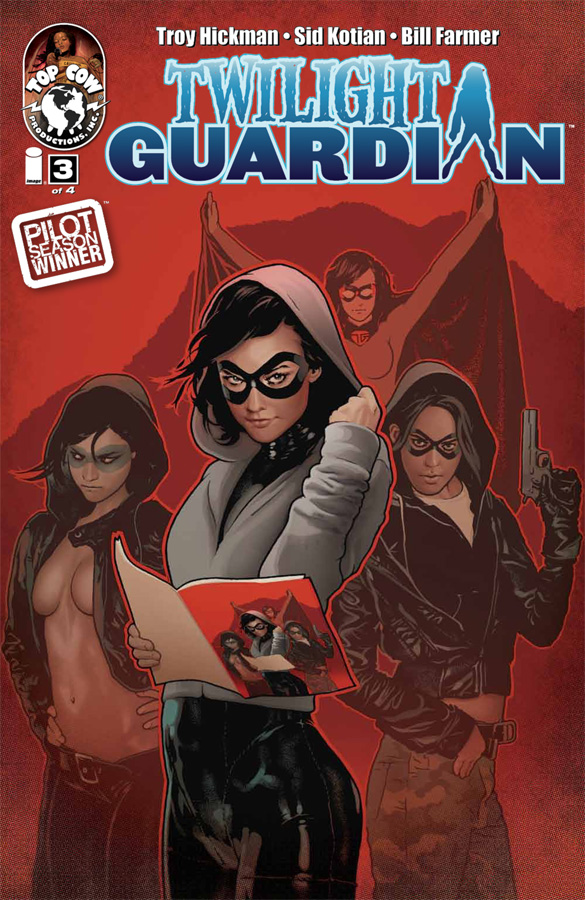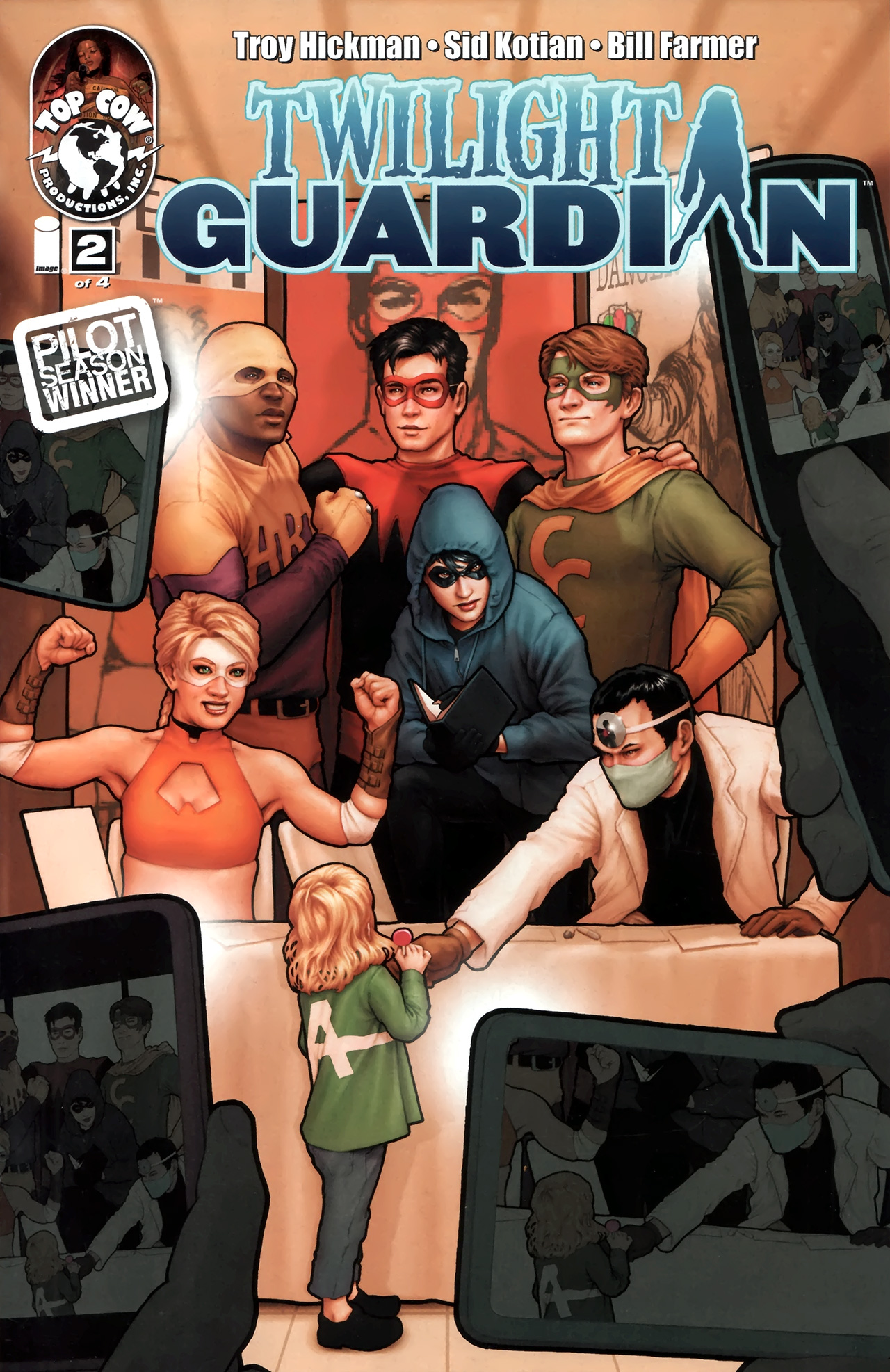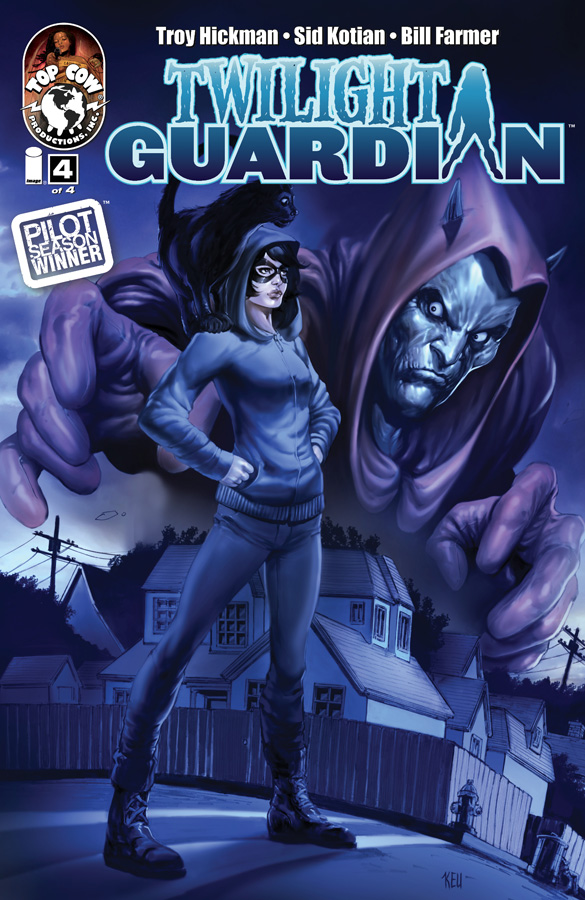Talking ‘Twilight Guardian’ with Troy Hickman
Each year Top Cow holds a contest for comic creators to pitch their new series in what they call Pilot Season. Think of it like a brand new batch of TV shows, but fans get to vote on which book they want to see become a series. One such winner was Twilight Guardian from Troy Hickman. I had the chance to talk to Troy about the series and the future of our favorite Guardian.
PA) Now that Twilight Guardian is over, what can we expect from you next?
TH) At the moment I'm working on some pitches with my pal Stan Timmons. I'm also trying to find a publisher who'll let me do an autobiographical comic. I truly believe I could do something special with such a book, something both readers and critics would dig. But I'm not sure if there's a company out there that would trust a relative unknown like myself on that kind of project. I guess we'll see. And I'm always open to picking up jobs, if anyone's interested.
PA) When you first created Twilight Guardian, what made you choose Top Cow and Pilot Season as the place to take it?

TH) Actually, Top Cow approached me about including Twilight Guardian in the Pilot Season competition. Back in 2003, when they contacted me about using my Holey Crullers scripts for the comic that eventually became Common Grounds, they were also interested in Twilight Guardian, a character I'd self-published in photocopied mini-comics back the early 90s. So we worked out a deal for the character, who then promptly sat around for five years! When it came time to do the 2008 Pilot Season, they remembered TG, and asked if I'd do a new one-shot with the character for it. I cobbled together a story from her two mini-comics appearances, fleshed it out, and voila!
PA) What was the Pilot Season experience like and how did it feel to win?
TH) It felt fantastic! But like most everything else I've done, my own self-doubts left me asking "was this supposed to happen???" Back when Common Grounds was nominated for a couple of Eisner Awards, I was in the same categories (Best Short Story and Best Anthology) with people like Neil Gaiman and Michael Chabon. So I found myself sort of feeling like I'd wandered into the wrong line somewhere! And likewise, when I was in the Pilot Season voting with people like Jay Faerber, Jonathan Hickman, Josh Fialkov, etc., I figured it was some sort of clerical error. So you can imagine how dreamlike it seemed when I actually won the darned thing. To be fair, though, I became an internet whirlwind during the voting period, though, wangling and wrangling every vote I could on every message board, chatroom, social network, etc. In all honesty, I got very little sleep during that "campaign." Most of the credit for winning has to go to all the folks who worked their tails off to help me across the finish line.
PA) There was quite a bit of down time between winning Pilot Season and actually getting the series out. What kept the book from hitting shelves sooner? (If you can’t speak on this one I understand)
TH) Well, I'm not completely sure myself, but I think part of the problem was that Top Cow needed to get some of the other Pilot Season stuff underway before they could get to the 2008 winners. I think a lot of folks don't really understand what all it entails to get a finished comic book from start to finish. For my part, though, I was ready to go at a moment's notice. I work very quickly and never miss a deadline. I'm like a crazed weasel on crack when it comes to writing comics.
 PA) I think the most interesting thing about the TG series was that there was almost no dialog. That’s very foreign in today’s comic market. What made you decide to go that route and what do you think made it successful?
PA) I think the most interesting thing about the TG series was that there was almost no dialog. That’s very foreign in today’s comic market. What made you decide to go that route and what do you think made it successful?
TH) There were a couple reasons for that. One of them is that I always like to challenge myself with a project. When I did Common Grounds, I wanted to see if I could do a superhero comic with basically NO action, just folks talking. So that comic was entirely dialog. For Twilight Guardian, I went the other way, having basically no dialog, and just caption boxes with TG's own personal narration.
More importantly, though, Twilight Guardian is a comic that's about perception, and by using only TG's thoughts, I'm able to make the reader constantly ask himself what he knows to be true. Since everything is learned second-hand, and sometimes THIRD hand, through TG's mental filter, you never know for sure what's real and what's in her admittedly skewed mind.
PA) I may have read this wrong but it seemed like you were doing homage to the different eras in comics ig: Golden, Silver and 90’s. Was this intentional to show the evolution of comics or something else altogether?
TH) The comic insert pages in TG served a number of purposes. Yeah, since the comic is partially about comic books themselves (and the girl who reads them), those pages are an homage to different comics throughout history. Beyond that, though, they also serve to reflect what's going on in Twilight Guardian's own world. Finally, they let me have a chance to write the kind of comics that I might not be able to elsewhere!
PA) If Twilight Guardian was to continue in either another mini or an ongoing title (my preference), where would the story go next?
TH) Good question. I think we'd probably continue examining some of the themes in the mini-series, such as what constitutes mental illness and functionality, and what defines a character as a hero. We might also look into the mystery that I've set up concerning her mother, father, and missing boyfriend. Or maybe we wouldn't...
 PA) When you’re writing do you write in full script or do you have another style that you use? Also is there a writing program you use or a created format that you have?
PA) When you’re writing do you write in full script or do you have another style that you use? Also is there a writing program you use or a created format that you have?
TH) I start by making extensive notes. I do my best thinking either in the shower or while driving. Then I break down those ideas into whatever number of pages the comic allows me. Finally I sit down to turn it into a full script. My scripts are fairly loose, though. I have the dialog and any stage directions that are CRUCIAL, then I leave the rest of it up to the artist. That's a large part of the fun of doing comics, the collaboration.
PA) Last question: Who would win in a fight? Jack Kirby in his prime or Stan Lee in his prime?
TH) Hard to say. Stan would turn it into a senses-shattering slugfest, but Jack would set his legs twelve feet apart and crackle with energy. I'd like to think in the end they'd settle their differences and sit down and create a Fantastic Four annual.
We'd like to thank Troy for talking to us today and be sure to look for the Twilight Guardian mini-series collected as a trade paper back in September from Top Cow. If you'd like more info on the series I'd recommend starting with our reviews
here.
 TH) Actually, Top Cow approached me about including Twilight Guardian in the Pilot Season competition. Back in 2003, when they contacted me about using my Holey Crullers scripts for the comic that eventually became Common Grounds, they were also interested in Twilight Guardian, a character I'd self-published in photocopied mini-comics back the early 90s. So we worked out a deal for the character, who then promptly sat around for five years! When it came time to do the 2008 Pilot Season, they remembered TG, and asked if I'd do a new one-shot with the character for it. I cobbled together a story from her two mini-comics appearances, fleshed it out, and voila!
TH) Actually, Top Cow approached me about including Twilight Guardian in the Pilot Season competition. Back in 2003, when they contacted me about using my Holey Crullers scripts for the comic that eventually became Common Grounds, they were also interested in Twilight Guardian, a character I'd self-published in photocopied mini-comics back the early 90s. So we worked out a deal for the character, who then promptly sat around for five years! When it came time to do the 2008 Pilot Season, they remembered TG, and asked if I'd do a new one-shot with the character for it. I cobbled together a story from her two mini-comics appearances, fleshed it out, and voila!
 PA) I think the most interesting thing about the TG series was that there was almost no dialog. That’s very foreign in today’s comic market. What made you decide to go that route and what do you think made it successful?
PA) I think the most interesting thing about the TG series was that there was almost no dialog. That’s very foreign in today’s comic market. What made you decide to go that route and what do you think made it successful? PA) When you’re writing do you write in full script or do you have another style that you use? Also is there a writing program you use or a created format that you have?
PA) When you’re writing do you write in full script or do you have another style that you use? Also is there a writing program you use or a created format that you have?